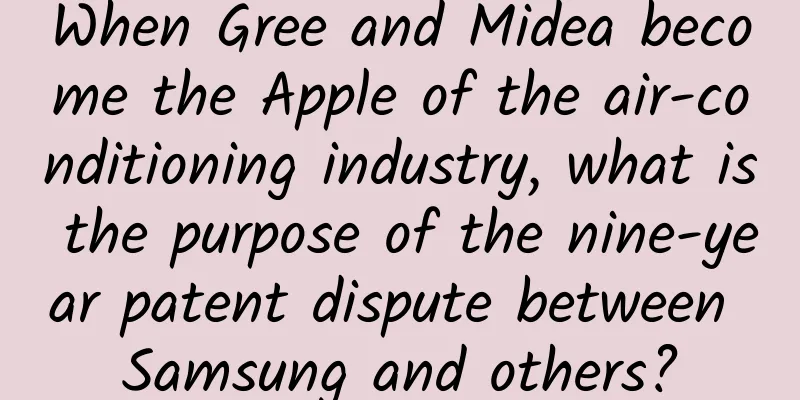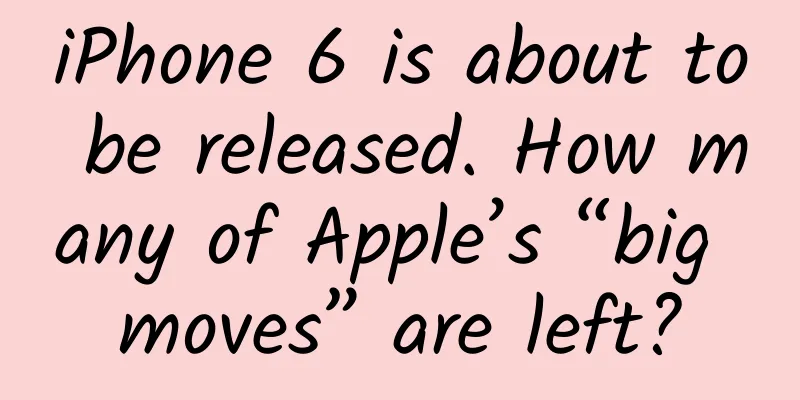When Gree and Midea become the Apple of the air-conditioning industry, what is the purpose of the nine-year patent dispute between Samsung and others?

|
The domestic air-conditioning market has now entered the peak sales season, which is closely related to the hot weather. Even though the industry's total inventory has approached 40 million, according to information obtained from various companies, there is no sign of slowing down, and the air-conditioning industry is still prosperous. However, while the domestic air-conditioning market has a bright future, China's two largest air-conditioning manufacturers, Gree and Midea, are fighting fiercely, once again bringing the patent war in the air-conditioning industry to the public's attention. The commercial farce continues to ferment, and "one kilowatt-hour of electricity per night" has become a laughing stock for competitors In fact, Gree and Midea have been grudged for nine years over many disputes related to the air-conditioning industry, including patent issues. As early as December 2008, Gree filed a lawsuit with the then Zhuhai Intermediate People's Court, claiming that Midea's "Mengjingxing" series of air conditioners infringed its invention patent right of "a method for controlling an air conditioner to operate according to a custom curve." The case was eventually decided by the Guangdong High Court, which ruled that Midea was suspected of infringing Gree Electric's air-conditioning technology invention patent, and ordered it to immediately stop selling related products and compensate Gree for economic losses of 2 million yuan. At that time, the case was rated as one of the "Top Ten National Intellectual Property Protection Cases of the Year". On the other hand, Midea, as the leading enterprise in the domestic air-conditioning industry, was severely tricked by Gree, and the resentment naturally deepened. Subsequently, patent wars, price wars, and verbal wars between Midea and Gree occurred from time to time. In 2009, Midea sued Gree for false advertising, becoming the first case of "false advertising of home appliances in China". In May 2010, Gree Air Conditioning sued Midea in Hefei, Anhui Province for suspected unfair competition, but the case has not been decided yet. This business farce that started 9 years ago is still fermenting. At present, Gree has filed a lawsuit against Midea again for patent infringement of its "Refrigeration King" series of air conditioners, and Midea is demanding 50 million yuan in compensation from Gree. Midea naturally does not want to become Gree's "patent cash machine", so it filed three patent infringement lawsuits against Gree in Suzhou and Guangzhou last week, with a total claim of 40 million yuan. At a time when claims of tens of millions continued to occur, Gree Group Chairman Dong Mingzhu also continued to speak out in public, questioning Midea's products. For example, she directly stated that the promotional slogan of Midea air conditioners, "one kilowatt-hour of electricity per night," was "false advertising," forcing Midea to change its slogan from "one kilowatt-hour of electricity per night" to "as low as one kilowatt-hour of electricity per night." It is a patent dispute and also a marketing strategy. The conflict between Gree and Midea is inevitable. The patent dispute is a technological dispute, but the constant entanglement between the two giants in the air-conditioning industry reflects more than just the technological competition between Gree and Midea. Take Apple and Samsung, both industry leaders, for example. At the time, the lawsuit between the two tech giants focused on software patents for smartphones such as auto-complete text input, touch search, and slide activation. This is somewhat similar to the current situation of Gree and Midea fighting over patent issues. Interestingly, according to the information described at the time, in the first few weeks of the lawsuit between Apple and Samsung, the news was reported on the front pages of major newspapers around the world, and even international news channels reported the patent lawsuit during prime time. If Samsung wanted to achieve similar media exposure through a traditional advertising campaign, it would probably cost far more than what Apple would have to pay its lawyers. According to Samsung's advertising budget in the US market in 2012, Samsung's global advertising expenditure in that year was as high as 4.3 billion US dollars, which is more than four times that of Apple. However, judging from the current situation, if patent litigation is incorporated into non-traditional marketing strategies, it will actually be a marketing case worthy of being written into textbooks. From this point of view, for Midea and Gree, the patent dispute between them can be completely understood as a marketing method that replicates the fight between Apple and Samsung. According to statistics, in the first quarter of this year, Midea's air conditioner market share was 28%, and the gap with Gree is narrowing. In terms of patent applications, as of 2016, Midea has accumulated more than 26,000 authorized patents. Gree's total number of authorized patents is 15,862. Gree felt the crisis when Midea took the opportunity to counterattack. Whether Midea needed to compete with Gree or Gree needed to restrict Midea's development, both air-conditioning brands needed to create a wave of publicity for their own products. From this point of view, to some extent, the "patent war" and "verbal dispute" between the two sides are inevitable means of publicity when the air-conditioning giants are confronting each other in products and markets. Especially compared with those popular "press conference brands", Gree and Midea who like to "make money in silence", perhaps a lawsuit is the way they are most willing to accept when trying to make their presence felt. As a winner of Toutiao's Qingyun Plan and Baijiahao's Bai+ Plan, the 2019 Baidu Digital Author of the Year, the Baijiahao's Most Popular Author in the Technology Field, the 2019 Sogou Technology and Culture Author, and the 2021 Baijiahao Quarterly Influential Creator, he has won many awards, including the 2013 Sohu Best Industry Media Person, the 2015 China New Media Entrepreneurship Competition Beijing Third Place, the 2015 Guangmang Experience Award, the 2015 China New Media Entrepreneurship Competition Finals Third Place, and the 2018 Baidu Dynamic Annual Powerful Celebrity. |
Recommend
New trends in ASO optimization in 2016!
The bell of 2016 has rung. Looking back on 2015, ...
Douyin promotion: Douyin traffic pool brings goods, and the business of Internet celebrities is really good
After becoming a super user traffic pool, it is n...
Tips for placing advertising on Tencent’s information flow!
As more and more industries move from the era of ...
Mom, please stop listening to those health rumors!!! Listen to what these 7 West China doctors say...
Probably everyone was You must have been bombarde...
Is it expensive to produce the Chifeng bargaining mini program? Chifeng bargaining applet production cost and process
Chifeng bargaining applet production price 1. Dis...
CHJ Automotive is about to launch the Ideal ONE with a range of 1,000km. Can extended-range hybrid vehicles become the new favorite of the market?
Recently, CHJ launched its smart electric vehicle...
Lei Jun's anxiety: Xiaomi has passed its peak and is in decline
Xiaomi released a new mobile phone, and it was th...
A successful H5 should hit the user's key points and achieve the operation purpose
Without discussing how to define “success”, can y...
[Summary] Tianya’s sixteen-year journey of product operation!
Many friends may know that Xing Ming is one of th...
Is it difficult to write brand copywriting for the Dragon Boat Festival? Share 15 for your reference!
The Zongzi Festival on May 5th is coming soon. Th...
Peng Gang of LeTV: Users are the only ones who decide the direction of product development
On August 27, at the first China Smart TV Industr...
Are you always attracting new users, but no highly active users are left?
Why are we always attracting new users but no hig...
How to use coupons for promotion, here are 4 tips for you!
Coupons are the most commonly used tool in our op...
Practical tips | How to do marketing promotion on Douban
What I want to share with you today are some of m...
Anxin No Source 3.0, a collection of three explosive gameplays, worth 8888 yuan
Course Description: The course comes from Anxin’s...









